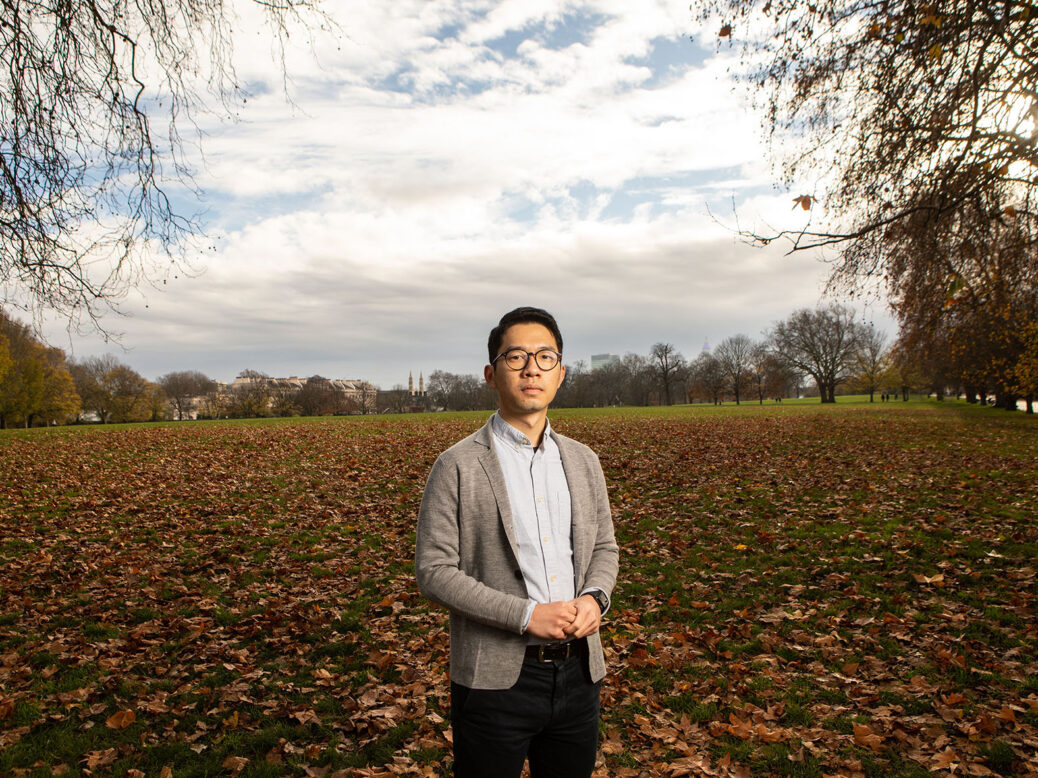
When Nathan Law boarded a London-bound plane in Hong Kong in the summer of 2020, he knew it might be for the last time.
After years of eroding freedoms in Hong Kong, China had just passed a wide-ranging National Security Law that criminalised anything that could vaguely be considered an act of secession, subversion, terrorism or collusion with foreign forces in the territory. As one of Hong Kong’s most prominent pro-democracy activists, Law knew he could be targeted. But even he has been surprised by the speed with which the law has been used to crack down on anyone who doesn’t toe the line. Journalists, entrepreneurs, judges and academics have all been prosecuted.
For Law, who was granted political asylum in the UK in April 2021, it’s been difficult to observe from afar. “You’re literally witnessing Hong Kong civil society, with decades of foundation, collapse.”
Bespectacled in a pressed white shirt with a grandfather collar, Law couldn’t look less like the troublemaking radical of Beijing’s warnings. We spoke on the same day the 28-year-old’s new book, Freedom: How We Lose it and How We Fight Back, is released in the UK. He was soft-spoken and polite, though passionate in his arguments.
Born in the Chinese city of Shenzhen, Law moved with his family to Hong Kong when he was six years old. The family was “blue collar”, he says. His father was a builder, his mother a street cleaner. They didn’t discuss politics at home. It wasn’t until 2010, when the Chinese writer and human rights activist Liu Xiaobo won the Nobel Peace Prize, that Law began to question what he was being taught. The morning after the prize was announced, the principal of his pro-Beijing secondary school made an announcement at a school assembly “denouncing” the award. “It really triggered my curiosity,” he said. Law began reading Liu’s work and researching democracy. “It really opened up a gate for me.”
On the other side of that gate lay the road to activism. By the time he was a 21-year-old student, Law had become a household name across Hong Kong for leading the 2014 Yellow Umbrella Movement, a student protest calling for free elections in the semi-autonomous Chinese territory. Two years later, aged 23, he was elected a lawmaker, the youngest in Hong Kong’s history. The celebrations didn’t last long, however, as authorities soon disqualified him for altering his oath of office. In 2017, he was jailed for two months because of his role in the protests of 2014.
Now exiled from Hong Kong and cut off from speaking to his family and friends back home, Law has continued his activism from the other side of the world. These days, however, he’s expanded his scope. While the dizzying backslide on freedom in Hong Kong is tied to its connection and proximity to China, Law insists that his home isn’t unique.
He points to Hungary and Poland as two explicit examples of European countries where democracy is blatantly under attack. Yet, Law warns, the threat of authoritarianism isn’t always obvious. While democracy can crumble quickly if not protected, it doesn’t happen overnight. Authoritarianism can creep – that’s part of the problem. Even nations with the most firmly established institutions could see democratic norms eroded over time if there isn’t a backlash.
Consider the case that has roiled British politics this week: a majority of MPs voted to overhaul the system that holds them to account after a Conservative MP, Owen Paterson, did not disclose he was paid by outside interests when lobbying ministers. (Following an unexpected wave of outrage and corruption accusations, the government has reversed course.) Are the UK’s democratic freedoms under threat too?
“Freedom is under threat everywhere,” Law stated firmly. A mixture of complacency and lack of interest, he suggested, has meant that too many nations – including the UK – don’t recognise a threat when it’s staring them in the face. “Democracy is not only a electoral system,” he pointed out. “It’s a series of values that we all treasure.”
Chief among those values, he said, is the freedom of the press and the right to protest. Those are often the first rights to be stamped out by authoritarian regimes. Yet the loss of those rights is also, not coincidentally, least likely to sound the alarm with the wider public. That’s why, Law emphasised, attacks on the press and on protesters should serve as the first warning sign, and civilians should push back on any encroachment.
So what is the international community’s role in all of this? “We need to see the rise of authoritarianism – or the global democratic decline – as a global crisis,” Law said. He pointed to the Economist Intelligence Unit’s democracy index, which in 2020 judged that less than 10 per cent of the world’s population lived in a true democracy, while more than a third of the world lived under authoritarian rule. Strengthening and expanding “alliances that are bound by democratic values”, and using those alliances to systematically counter China and other undemocratic regimes, is the only way to reverse that trend. Ultimately, he added, it’s up to those who live in free or mostly free societies to stop authoritarianism.
“The price of freedom is eternal vigilance,” Law said. “You are the beneficiary of it – but you’re also the guardians of it.”
[Listen also: Hong Kong democracy after one year of the National Security Law]





